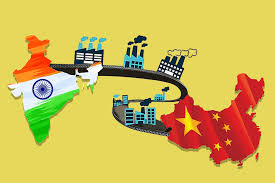Ahmedabad
(Head Office)Address : 506, 3rd EYE THREE (III), Opp. Induben Khakhrawala, Girish Cold Drink Cross Road, CG Road, Navrangpura, Ahmedabad, 380009.
Mobile : 8469231587 / 9586028957
Telephone : 079-40098991
E-mail: dics.upsc@gmail.com

Making India a Manufacturing Hub
Context:
• Manufacturing pushed India’s GDP growth rate to 7.6% in Q2.
• S&P Global recently said India is likely to become third largest economy by 2030. It said India’s growth path to become the third largest economy will depend on the “paramount test” of whether it can become the next global manufacturing hub moving away from service led economy.
Manufacturing sector in India:
• Manufacturing is defined as process of production of goods in large quantities by processing the raw materials into more valuable products. Example, production of cloth from cotton.
• India is amongst the top 10 manufacturing nations of the world.
• It is the 2nd largest mobile phone manufacturer and is 3rd largest startup environment.
Significance of manufacturing sector:
• Brings valuable Foreign exchange.
• Absorbs excess labour from agricultural sector.
• Better scope of earning as compared to agriculture sector.
• Reduces regional disparities.
• Self-sufficiency with improved export competitiveness.
Which factors contribute to India’s rise as a manufacturing hub?
• Large workforce
• High economic growth. The S&P report says India’s economy is is expcted to bt eht fastest growing major economy in the next 3 years.
• Large domestic market, declining rural-urban divide.
• Top companies are shifting bases from China popularly known as adopting China+1 strategy to diversify their production facilities.
• Supply chain disruptions due to over dependence on China especially as seen during Covid has prompted nations to develop initiatives such as Supply chain resilience initiative.
• Demographic dividend is on our side however we need to invest more in skilling of our graduates, increasing female participation in the labour force is also essential to reap our demographic dividend.
What are the challenges in achieving our Manufacturing Goals?
• While compared to Manufacturing sector’s contribution to GDP it has remained stagnant at 15-17% since 1991.
• Skilled manpower – In India, only 5% of workers are formally skilled compared to 24% in China, 75% in Germany etc.
• Our exports are not competitive in the global market due to higher logistics cost, use of obsolete technology, poor quality, higher fluctuations in raw materials.
• Lengthy compliance procedures and poor intellectual property rights (IPR) protection, lengthy environmental clearance procedure.
• External challenges such as cyclical slowdown in Global markets, slow progress on trade agreements (EU, UK) etc
• Challenges possessed by Globalization and WTO multilateralism.
Way Forward
• India’s dream of becoming manufacturing hub can be realized when there is room for better industryacademia linkage with skilling given prime importance, policy harmonization between state-central government is essential.
• Additionally, India should do it all to be part of Global value supply chain. Increasing exports by reducing trade barriers is essential to boost our manufacturing prospects.

Address : 506, 3rd EYE THREE (III), Opp. Induben Khakhrawala, Girish Cold Drink Cross Road, CG Road, Navrangpura, Ahmedabad, 380009.
Mobile : 8469231587 / 9586028957
Telephone : 079-40098991
E-mail: dics.upsc@gmail.com
Address: A-306, The Landmark, Urjanagar-1, Opp. Spicy Street, Kudasan – Por Road, Kudasan, Gandhinagar – 382421
Mobile : 9723832444 / 9723932444
E-mail: dics.gnagar@gmail.com
Address: 2nd Floor, 9 Shivali Society, L&T Circle, opp. Ratri Bazar, Karelibaugh, Vadodara, 390018
Mobile : 9725692037 / 9725692054
E-mail: dics.vadodara@gmail.com
Address: 403, Raj Victoria, Opp. Pal Walkway, Near Galaxy Circle, Pal, Surat-394510
Mobile : 8401031583 / 8401031587
E-mail: dics.surat@gmail.com
Address: 303,305 K 158 Complex Above Magson, Sindhubhavan Road Ahmedabad-380059
Mobile : 9974751177 / 8469231587
E-mail: dicssbr@gmail.com
Address: 57/17, 2nd Floor, Old Rajinder Nagar Market, Bada Bazaar Marg, Delhi-60
Mobile : 9104830862 / 9104830865
E-mail: dics.newdelhi@gmail.com